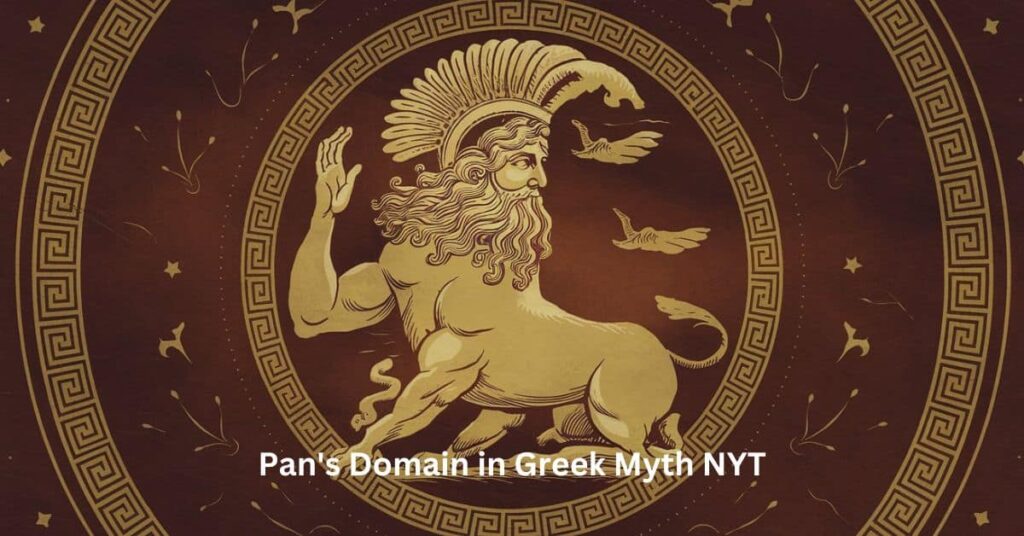Pan’s Domain in Greek Myth NYT: A Deep Dive into the Mythical World of the God Pan

In Greek mythology, Pan is one of the most fascinating deities, known for his wild, untamed nature and connection to forests, pastures, and the rustic wilderness. You may have come across a crossword clue for “Pan’s domain, in Greek myth” in the New York Times (NYT) crossword, and this has piqued your curiosity about Pan and his mythical domain. This comprehensive article will explore Pan’s domain in Greek mythology, providing insights that go beyond the simple crossword answer. We’ll delve into Pan’s world, his significance, and his lasting impact on both ancient and modern culture.
Throughout this article, we will be optimizing the keyword “Pan’s domain in Greek myth nyt” to ensure it ranks well in search engine results, providing a humanized and easy-to-read exploration of this intriguing topic.
Who is Pan in Greek Mythology?
Pan, the god of the wild, shepherds, flocks, nature, and rustic music, is one of the most ancient Greek gods. Unlike the more refined Olympian gods, Pan is often depicted as half-human, half-goat, with a long beard, goat’s horns, and hooves. He is also known for his love of music, playing the panpipes (named after him), and is closely associated with fertility, pastoral life, and the natural world.
Pan’s Personality and Symbolism
Pan embodies the untamed, raw essence of nature. He is mischievous, free-spirited, and known for his sexual prowess, often pursuing nymphs and other creatures of the forest. The word “panic” is derived from Pan’s ability to instill sudden, uncontrollable fear in those who encountered him in the wild—a fear known as “panic terror.” This reflects Pan’s connection to the unpredictable and uncontrollable forces of nature.
Pan’s Domain in Greek Mythology
When we think of Pan’s domain, we imagine untamed natural landscapes, such as woodlands, groves, and mountains. Pan’s realm is not in the grandeur of Mount Olympus, where the Olympian gods reside, but in the wild, untouched parts of the world. His domain can be described as the countryside and natural settings, where shepherds watch over their flocks and people live close to the land.
Arcadia: Pan’s Primary Domain
Pan’s domain is closely associated with Arcadia, a mountainous region in the central Peloponnese. Arcadia, in Greek myth, was a rural, pastoral paradise, untouched by urbanization, where shepherds and nymphs lived in harmony with nature. The name Arcadia has come to symbolize an idyllic wilderness, a place of natural beauty and simplicity.
The New York Times crossword puzzle clue “Pan’s domain, in Greek myth” is often answered with “Arcadia.” This makes sense because Arcadia represents the quintessential image of Pan’s natural and rustic domain.
Arcadia as a Symbol of Wilderness and Simplicity
In literary tradition, Arcadia has come to symbolize a utopia of peace and simplicity, often used by poets and writers as a setting for pastoral tales. This tradition goes back to ancient Greece but has been popularized in Renaissance art and literature as well. Pan’s domain, in this sense, represents not only the physical wild lands but also a way of life connected to nature.
Pan’s Role in Greek Mythology
Pan plays a unique role in Greek mythology as a figure of fertility, nature, and rustic music. He is often depicted as frolicking with nymphs, shepherds, and other nature spirits. His presence in mythology reflects the importance of rural life in ancient Greece, where the majority of people worked the land and lived in small, agricultural communities.
Pan and the Nymphs
One of the most famous myths involving Pan is his pursuit of the nymph Syrinx. Syrinx, a beautiful water nymph, fled from Pan’s advances and begged the gods to help her escape. They transformed her into a bed of reeds, and Pan, heartbroken, fashioned the first set of panpipes (or syrinx) from those reeds. This myth illustrates Pan’s connection to music and nature, as well as his untamed, passionate nature.
Pan and Dionysus
Pan is often associated with the god Dionysus, who is the god of wine, ecstasy, and revelry. Both gods embody the primal, ecstatic side of life, and they are frequently depicted together in ancient Greek art and myth. Pan would often accompany Dionysus on his adventures, bringing music and joy to his followers.
The Panic Terror
One of Pan’s most fascinating attributes is his ability to cause sudden, irrational fear or panic. This “panic terror” was said to strike people suddenly when they encountered Pan in the wild, especially during the midday heat. In this way, Pan represents the unpredictability of the natural world, where danger and fear can arise at any moment.
Pan’s Influence on Modern Culture
Pan’s domain in Greek mythology continues to captivate the modern imagination. His figure has influenced not only literature but also music, art, and psychology. For example, the term “panic” is still used today to describe sudden fear or anxiety. Additionally, Pan has been portrayed in modern literature and film, such as in The Chronicles of Narnia and Peter Pan, where his wild, mischievous nature is echoed in modern storytelling.
Pan in Literature and Art
During the Renaissance, Pan’s image experienced a revival as part of the humanist movement. Writers and artists drew on Pan as a symbol of nature, wilderness, and pastoral life. Pan has appeared in countless poems, plays, and artworks over the centuries, often representing the connection between humanity and the natural world.
Pan in Psychology
The great psychologist Carl Jung identified Pan as an archetype of the wild, untamed side of the human psyche. Jung used Pan to illustrate the concept of the “shadow,” the part of ourselves that is instinctual, primal, and often hidden from our conscious mind. Pan’s wild nature is a metaphor for the parts of our own nature that are raw, untamed, and sometimes fearful.
The Significance of Pan’s Domain in Greek Mythology
Pan’s domain in Greek myth is much more than just a physical location like Arcadia; it represents the natural, untamed forces of the world. In ancient Greek culture, nature was both a source of life and a source of danger. Pan embodies both aspects of nature: he is the god of fertility and shepherds, but he is also the god of panic and fear. His domain is the wilderness, where human civilization gives way to the untamed, primal forces of the earth.
Arcadia as a Metaphor
Arcadia, Pan’s domain, serves as a powerful metaphor for the relationship between humans and nature. It is a place of harmony, where people live in balance with the natural world, but it is also a place of mystery and danger, where the unpredictable forces of nature reign supreme. In this sense, Pan’s domain reminds us of the need to respect and coexist with the natural world.
Pan as a Symbol of Nature’s Duality
Pan represents both the beauty and the fear of nature. His music is beautiful, but his presence can cause terror. This duality makes Pan one of the most complex and enduring figures in Greek mythology. He is not just a god of the wild; he is a reminder of nature’s power and mystery.
FAQs About Pan’s Domain in Greek Myth NYT
1. What is Pan’s domain in Greek myth?
Pan’s domain in Greek mythology is primarily the wilderness, forests, mountains, and pastures. Specifically, it is associated with Arcadia, a region of Greece known for its rustic beauty and untamed nature.
2. Why is Arcadia called Pan’s domain?
Arcadia is called Pan’s domain because it is an idyllic, mountainous region in Greece that symbolizes the pastoral and rustic lifestyle Pan embodies. Arcadia represents the perfect natural setting for Pan, away from the hustle and bustle of cities.
3. What is the significance of Pan in Greek mythology?
Pan is significant in Greek mythology as the god of nature, fertility, shepherds, and rustic music. He represents the untamed forces of nature and is often associated with sudden fear or “panic.” Pan also symbolizes the balance between human civilization and the wild natural world.
4. Why is Pan associated with panic?
Pan is associated with panic because, in Greek myth, he had the power to instill sudden, irrational fear in people who encountered him in the wild. This phenomenon became known as “panic terror,” and the modern word “panic” derives from his name.
5. What is Pan’s relationship with other gods?
Pan is often associated with the god Dionysus, who shares Pan’s connection to wildness, revelry, and the ecstatic side of life. Pan also interacts with other gods in various myths, but he is primarily seen as a god of the rustic, wild parts of the world.





